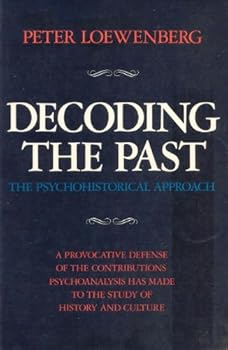Decoding the Past: The Psychohistorical Approach
Select Format
Select Condition 
Book Overview
In Decoding the Past, Peter Loewenberg has collected eleven of his brilliant essays on psychohistory, a discipline that has emerged from the synthesis of traditional historical analysis and clinical psychoanalysis. He surveys this relatively new fi eld-its methods and its problems-to show the special contributions that psychoanalysis can make to history. He then further explores the psychohistorical method by applying it to studies of personality,...
Format:Hardcover
Language:English
ISBN:0520052447
ISBN13:9780520052444
Release Date:January 1984
Publisher:University of California Press
Length:318 Pages
Weight:0.95 lbs.
Customer Reviews
2 ratings
Interesting and Brilliantly Researched
Published by Thriftbooks.com User , 18 years ago
My purchase and interest in this book started when I had to do a research paper on Heinrich Himmler's psychobiographical background. There is an extremely well written chapter in this book which is based primarily off of the work of Angress and Smith who were the first to ever write on Himmler's teenage diaries. What you find about Heinrich Himmler, I will leave for you, the reader, to discover as it will definitely throw you for a loop that no fiction book could even do. I would recommend this book to anyone who is interested in history beyond just dates, names and statistics. This is a great beginner's book for those who have always wondered what psychological factors played into history. The only reason I gave it four stars instead of five is because Loewenberg made a few comments on sexuality that are broad and unfounded.
Psychohistory, not Psychotichistory
Published by Thriftbooks.com User , 23 years ago
In his book, Decoding the Past: The Psychohistorical Approach, author Peter Loewenberg attempts to outline a method of doing history through the eyes of a psychologist. After presenting the problems of a limited scope in historical approach, Loewenberg then discusses how a psychohistorian should be trained and in the last two parts of the book, the author includes what he himself seems to think is psychohistorical writing about leaders and followers in Austrian and Germany during the late 19th and early 20th centuries. Peter Loewenberg gives some convincing arguments at the beginning of Decoding the Past as to why psychology should be an avenue towards a greater understanding of history. Loewenberg notices that the task of the historian and the task of the psychologist are similar in that they both seek to use as much "evidence" as is pertinent, they both study human acts and motivations, and they are both dealing with (in some sense) "the past." Loewenberg argues that both the psychologist and the historian should be trained similarly and that it is this precisely this psychological training for the historian that will enable one to have a deeper breath of knowledge about any past events. His argument towards a psychohistorical approach is solid and realistic enough. It gives further credence towards the still shaky realm of cultural studies in that it provides a model for understanding individual and group behavior through psychology. What follows in part II could also have been convincing, but here Loewenberg appears to be taking the notion of psychology in academics a bit too far. Rather than concentrating on how a graduate student can become a psychohistorian, Loewenberg instead applies his own and Sigmund Freud's ideas as to what the graduate student-faculty relationship entails. While he does have some good points here and there (the graduate school is, in some ways, an extension of the "family") Loewenberg is likely to lose the reader with declarative statements such as, "The threat is of temptation to homosexual submission," (52) and "the desire of teachers to have disciples is in part an expression of the urge to transcend mortality and the fear of extinction." (69) It seems as if Loewenberg depends entirely too much on Freud and psychoanalysis in understanding the graduate school relationship, and although he might have had some convincing arguments, it seems as if Loewenberg simply used his psychological education as a carte blanche to make sweeping generalizations and unfounded claims in the name of psychoanalysis. This take-what-you-can-and-run-with-it approach is even more evident in Loewenberg's own historical writing on various groups and group leaders in the last half of the book. What drove Theodor Herzl into becoming a Zionist was his "mental associations with himself as the messiah." (104) Victor and Friedrich Adler are examples of the Oedipal conflict in that, in order to get his true father's attention, Fried






